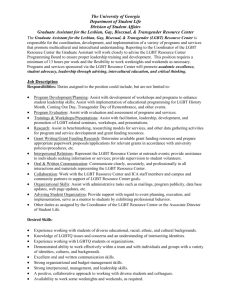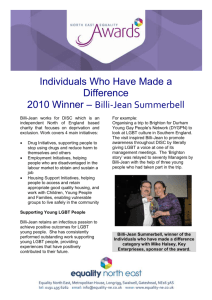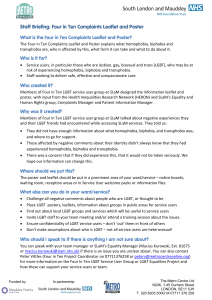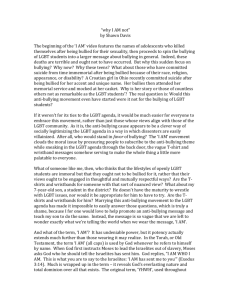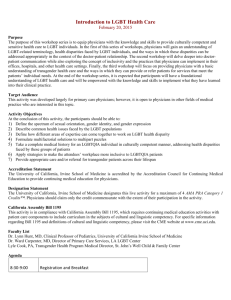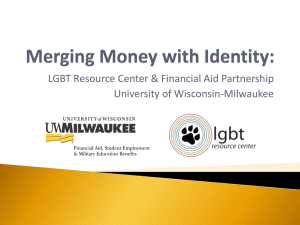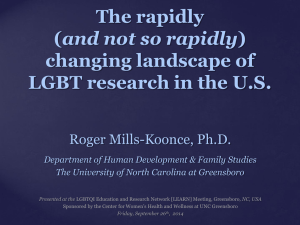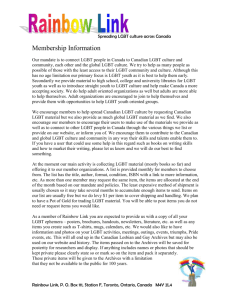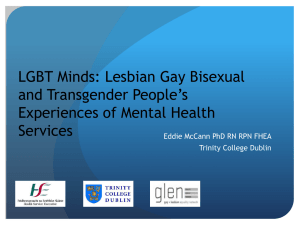Eric Carlson - National Long-Term Care Ombudsman Resource
advertisement
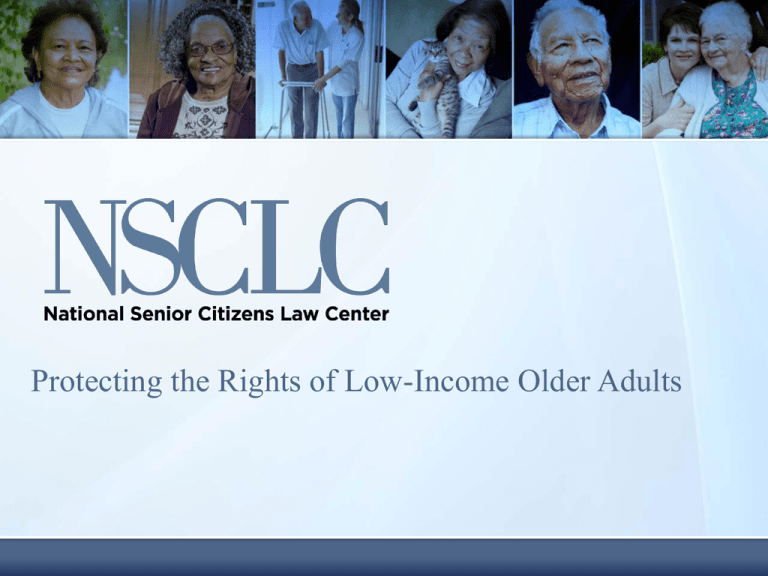
Protecting the Rights of Low-Income Older Adults The National Senior Citizens Law Center is a non-profit organization whose principal mission is to protect the rights of low-income older adults. Through advocacy, litigation, and the education and counseling of local advocates, we seek to ensure the health and economic security of those with limited income and resources, and access to the courts for all. For more information, visit our Web site at www.NSCLC.org. Advocating for LGBT Long-Term Care Consumers www.lgbtlongtermcare.org Eric Carlson National Senior Citizens Law Center www.NSCLC.org 3 On-Line Survey 769 respondents –284 of respondents were LGBT older adults Survey designed to surface issues, not to produce statistically significant results 4 Report Released Early 2011 • LGBT Older Adults in Long-Term Care Facilities: Stories from the Field – Available at www.lgbtlongtermcare.org 5 Report Summary Key areas of concern: • Fear of being out (78%) • Harassment by residents and staff • Refusal to accept medical power of attorney • Refusal to use preferred name / pronoun • Refusal to provide care • Wrongful discharge 6 Report Results When asked whether LGBT older adults could be open with facility staff, only 22% of LGBT respondents answered “yes”. 78% responded that they could not or would not be open about their sexual orientation and/or gender identity with staff at a nursing home. 7 Afraid to Be Out: Vera & Zayda’s Story • Together 58 years • Vera moved to assisted living – Zayda claims to be “sister” • Later, after Vera dies, Zayda herself moves to an assisted living facility. – Scared to exhibit photos of the couple – Afraid to share or tell the truth – Other residents talk much about spouses, grandchildren, etc., but Zayda keeps her personal life hidden 8 Afraid to Be Out: Ombudsman’s Response • Speak to resident. • With resident’s permission, speak to facility staff (e.g., social service designee, activity director, director of nursing) – Nursing facility can take steps to make facility atmosphere more welcoming to LGBT residents – cultural competence training – Can be considered part of individual accommodation under Nursing Home Reform Law, or under assisted living laws in many states 9 Discrimination in Service Provision: John & Jack’s Story • Jack went 16 days before shower, evidently because staff members were “uncomfortable” assisting him – John now brings Jack home when Jack needs shower 10 Discrimination in Service Provision: Ombudsman’s Response • Refusal to provide care is clear violation of Nursing Home Reform Law, or state assisted living law • Maybe also want to do some affirmative cultural competence training 11 Decisionmaking Disputes: When “the Family” Swoops In • Biological family decided partner had no rights to property or decisions – Partner not allowed to visit – Family sells home 12 At this Time, Federal Visitation Protections for Hospital Patients • April 15, 2010 – President Obama issues memo. –Directs CMS to promulgate regulations to ensure that hospitals respect patients’ rights to designate visitors. • Visitation should not be restricted to spouses and blood relations. 13 Revised Hospital Regulations • Revision to 42 C.F.R. §482.13(h) (hospitals)and §485.535(f) (critical access hospitals). –Must have visitation policies. –Patient must be informed of visitation rights, including any clinical restrictions. –Patient must be informed of right to receive designated visitors, including but not limited to a domestic partner. 14 Decisionmaking Disputes: Ombudsman’s Response • Decisionmaking rules vary somewhat from state to state – #1 Rule – put your wishes in power of attorney or other document, even if state provides for LGBT marriage or domestic partnerships • As this point, references in CMS Surveyor’s Guidelines to “family” do not include LGBT partners (e.g., visitation and notice) – Federal “Defense of Marriage Age” prohibits federal government from treating LGBT couples as “married” 15 The Future (#1) • Likely some movement from CMS (surveyor’s guidelines, etc.) • Mandate training – E.g., Cal. Health & Safety Code §1257.5 • Health professionals working in nursing facilities must receive state-prescribed training on preventing and eliminating discrimination based on sexual orientation and gender identity 16 The Future (#2) • Good argument to be made that cultural competence is good business – LGBT seniors are looking for setting in which they can be out and comfortable 17 Please Contact with Questions or Suggestions Eric Carlson National Senior Citizens Law Center – ecarlson@nsclc.org – (213) 674-2813 www.NSCLC.org 18
